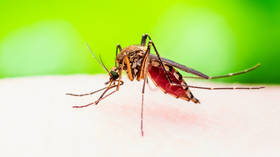First deaths from rare disease registered in Brazil

Brazil has recorded the world’s first deaths from the Oropouche virus after two women died of the illness, which is spread by infected flies and mosquitos, the country’s health ministry has said.
Oropouche fever, named after the region in Trinidad and Tobago where it was first discovered, is a tropical viral infection transmitted from the blood of sloths to humans by infected midges and mosquitoes. Since the disease was discovered in 1954, cases have been reported in Central America and South America, particularly in the regions around the Amazon basin.
The two victims from the northeastern state of Bahia were “under 30 years old, with no comorbidities, but had signs and symptoms similar to a severe case of dengue,” according to the statement released by the health ministry on Thursday.
The ministry also said it had recorded 7,236 cases of the Oropouche infection in 2024, adding that the disease was first isolated in Brazil back in 1960. Most cases have been reported in the states of Amazonas and Rondonia.
Brazilian health authorities are currently investigating another suspected death from Oropouche fever in the southern state of Santa Catarina, as well as six possible cases of transmission of the virus from mother to child, leading to two fetal deaths.
Symptoms of the Oropouche disease are similar to those of dengue, such as fever, muscle aches, stiff joints, headache, vomiting, nausea, chills, and sensitivity to light, the ministry said, adding that they commonly last for three to six days.
Earlier this year, the Ministry of Public Health in Cuba reported outbreaks of Oropouche virus disease from two provinces, Santiago de Cuba and Cienfuegos. In October 2020, the World Health Organization (WHO) reported the first detection of Oropouche virus in French Guiana.
At the time, the WHO stated that there was no evidence of human-to-human Oropouche virus transmission.













